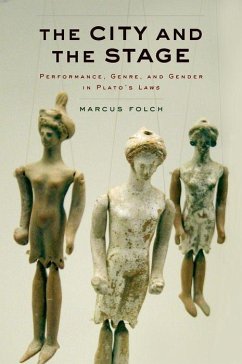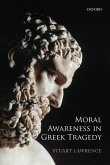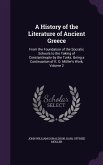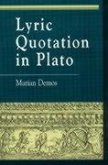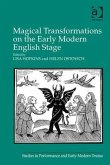- Gebundenes Buch
- Merkliste
- Auf die Merkliste
- Bewerten Bewerten
- Teilen
- Produkt teilen
- Produkterinnerung
- Produkterinnerung
The Polis and the Stage provides an exploration of Plato's final engagement with the poetic tradition. Special attention is given to the dialogue between philosophy and poetry, the performative properties of language, the psychology of aesthetic response, genre, gender, and the status of women in the ideal city envisaged in the Laws.
Andere Kunden interessierten sich auch für
![Oxford Readings in Aristophanes Oxford Readings in Aristophanes]() Erich Segal (ed.)Oxford Readings in Aristophanes215,99 €
Erich Segal (ed.)Oxford Readings in Aristophanes215,99 €![Language of Atoms Language of Atoms]() W H ShearinLanguage of Atoms156,99 €
W H ShearinLanguage of Atoms156,99 €![Moral Awareness in Greek Tragedy Moral Awareness in Greek Tragedy]() Stuart LawrenceMoral Awareness in Greek Tragedy228,99 €
Stuart LawrenceMoral Awareness in Greek Tragedy228,99 €![A History of the Literature of Ancient Greece A History of the Literature of Ancient Greece]() John William DonaldsonA History of the Literature of Ancient Greece44,99 €
John William DonaldsonA History of the Literature of Ancient Greece44,99 €![Wandering Poets and Other Essays on Late Greek Literature and Philosophy Wandering Poets and Other Essays on Late Greek Literature and Philosophy]() Alan CameronWandering Poets and Other Essays on Late Greek Literature and Philosophy153,99 €
Alan CameronWandering Poets and Other Essays on Late Greek Literature and Philosophy153,99 €![Lyric Quotation in Plato Lyric Quotation in Plato]() Marian DemosLyric Quotation in Plato140,99 €
Marian DemosLyric Quotation in Plato140,99 €![Magical Transformations on the Early Modern English Stage Magical Transformations on the Early Modern English Stage]() Lisa HopkinsMagical Transformations on the Early Modern English Stage204,99 €
Lisa HopkinsMagical Transformations on the Early Modern English Stage204,99 €-
-
-
The Polis and the Stage provides an exploration of Plato's final engagement with the poetic tradition. Special attention is given to the dialogue between philosophy and poetry, the performative properties of language, the psychology of aesthetic response, genre, gender, and the status of women in the ideal city envisaged in the Laws.
Hinweis: Dieser Artikel kann nur an eine deutsche Lieferadresse ausgeliefert werden.
Hinweis: Dieser Artikel kann nur an eine deutsche Lieferadresse ausgeliefert werden.
Produktdetails
- Produktdetails
- Verlag: Hurst & Co.
- Seitenzahl: 400
- Erscheinungstermin: 30. November 2015
- Englisch
- Abmessung: 236mm x 157mm x 36mm
- Gewicht: 640g
- ISBN-13: 9780190266172
- ISBN-10: 0190266171
- Artikelnr.: 47864257
- Herstellerkennzeichnung
- Libri GmbH
- Europaallee 1
- 36244 Bad Hersfeld
- gpsr@libri.de
- Verlag: Hurst & Co.
- Seitenzahl: 400
- Erscheinungstermin: 30. November 2015
- Englisch
- Abmessung: 236mm x 157mm x 36mm
- Gewicht: 640g
- ISBN-13: 9780190266172
- ISBN-10: 0190266171
- Artikelnr.: 47864257
- Herstellerkennzeichnung
- Libri GmbH
- Europaallee 1
- 36244 Bad Hersfeld
- gpsr@libri.de
Marcus Folch is Assistant Professor of Classics at Columbia University. His published work includes studies of ancient Greek literature, philosophy, and literary criticism, as well as classical reception in the 20th century.
* Introduction: Performance and the Second-Best City
* Abstract
* 1 Introduction
* 2 An Ancient Quarrel Revisited
* 3 The Laws, Its City, Its Scope
* 4 Paradigmatism and the 'Second-Best' Politeia
* 5 The Correct Method (orthê methodos) of Cultural Criticism
* 6 Conclusions
* Notes
* Chapter 1. Marionettes of the Soul: Performance and the Psychology of
Mousikê in Plato's Laws
* Abstract
* 1.1 Introduction
* 1.2 Theoretical Orientations: Performance, Performativity, Political
Dissent
* 1.3 Of Puppets and Passions: The Moral Psychology of Performance in
Plato's Laws
* 1.4 Virtue, Education, Aesthetic Response: A Model of Performativity
* 1.5 Inscription and the Making of a Philosophical Performance Culture
* 1.6 Conclusions
* Notes
* Chapter 2. The Chorus and the Critic: Literary Criticism,
Theatrocracy, and the Performance of Philosophy
* Abstract
* 2.1 Introduction
* 2.2 Critical Errors: Genre, Theatrocracy, and the Unideal City
* 2.3 Setting the Stage: Pleasure, Judgment, and the Performance of
Philosophy
* 2.4 Beyond the Choral Muse: The Chorus of Dionysus and the
Metaphysics of Literary Criticism
* 2.5 Conclusions
* Notes
* Chapter 3. Laws' Genres: Hymns, Encomia, and the Remaking of Lament
* Abstract
* 3.1 Th Introduction:
* 3.2 The Laws' Genres: Hymns, Encomia, and the Politics of Euphêmia
* 3.3 The Laws in Praise and Blame
* 3.4 Funerary Regained
* 3.5 Conclusions
* Notes
* Chapter 4. Unideal Genres and the Ideal City: Comedy, Tragedy, and
the Limits of the City Dancing
* Abstract
* 4.1 Introduction
* 4.2 Comedy, Threnody, and the Performance of Alterity
* 4.3 From Antithesis to Identity: Comedic and Iambic Invective
* 4.4 Plato's Tragic Muse
* 4.5 Beyond the Politics of Performance: ta bakkheia and the Genres of
Ecstasy
* 4.6 Conclusions
* Notes
* Chapter 5. Women's Statuses in Plato's Laws: Nature, Gender, Law, and
the Performance of Citizenship
* Abstract
* 5.1 Introduction
* 5.2 'Natural' Heterosexuality
* 5.3 Transgendered Virtues and the Social Contract
* 5.4 Natural Correction: Feasting, Warfare, Schooling, and the 'Trope
of Life' (tropos tou biou)
* 5.5 Unnatural Limitations: The Political Lives of Women
* 5.6 Conclusions
* Notes
* Chapter 6. Engendering Harmonies: Women's Songs in Plato's Laws
* Abstract
* 6.1 Introduction
* 6.2 Veils of Silence: Women, Theater, and Performance in Athens and
Magnesia
* 6.3 Performance, Performativity, and the Making of Citizen Women
* 6.4 'Cultic Citizenship' Revisited: Lament and the Female Voice
* 6.5 Conclusions
* Notes
* Epilogue. Plato's Last Long: A Postlude on Law and the Preludes
* Bibliography
* Abstract
* 1 Introduction
* 2 An Ancient Quarrel Revisited
* 3 The Laws, Its City, Its Scope
* 4 Paradigmatism and the 'Second-Best' Politeia
* 5 The Correct Method (orthê methodos) of Cultural Criticism
* 6 Conclusions
* Notes
* Chapter 1. Marionettes of the Soul: Performance and the Psychology of
Mousikê in Plato's Laws
* Abstract
* 1.1 Introduction
* 1.2 Theoretical Orientations: Performance, Performativity, Political
Dissent
* 1.3 Of Puppets and Passions: The Moral Psychology of Performance in
Plato's Laws
* 1.4 Virtue, Education, Aesthetic Response: A Model of Performativity
* 1.5 Inscription and the Making of a Philosophical Performance Culture
* 1.6 Conclusions
* Notes
* Chapter 2. The Chorus and the Critic: Literary Criticism,
Theatrocracy, and the Performance of Philosophy
* Abstract
* 2.1 Introduction
* 2.2 Critical Errors: Genre, Theatrocracy, and the Unideal City
* 2.3 Setting the Stage: Pleasure, Judgment, and the Performance of
Philosophy
* 2.4 Beyond the Choral Muse: The Chorus of Dionysus and the
Metaphysics of Literary Criticism
* 2.5 Conclusions
* Notes
* Chapter 3. Laws' Genres: Hymns, Encomia, and the Remaking of Lament
* Abstract
* 3.1 Th Introduction:
* 3.2 The Laws' Genres: Hymns, Encomia, and the Politics of Euphêmia
* 3.3 The Laws in Praise and Blame
* 3.4 Funerary Regained
* 3.5 Conclusions
* Notes
* Chapter 4. Unideal Genres and the Ideal City: Comedy, Tragedy, and
the Limits of the City Dancing
* Abstract
* 4.1 Introduction
* 4.2 Comedy, Threnody, and the Performance of Alterity
* 4.3 From Antithesis to Identity: Comedic and Iambic Invective
* 4.4 Plato's Tragic Muse
* 4.5 Beyond the Politics of Performance: ta bakkheia and the Genres of
Ecstasy
* 4.6 Conclusions
* Notes
* Chapter 5. Women's Statuses in Plato's Laws: Nature, Gender, Law, and
the Performance of Citizenship
* Abstract
* 5.1 Introduction
* 5.2 'Natural' Heterosexuality
* 5.3 Transgendered Virtues and the Social Contract
* 5.4 Natural Correction: Feasting, Warfare, Schooling, and the 'Trope
of Life' (tropos tou biou)
* 5.5 Unnatural Limitations: The Political Lives of Women
* 5.6 Conclusions
* Notes
* Chapter 6. Engendering Harmonies: Women's Songs in Plato's Laws
* Abstract
* 6.1 Introduction
* 6.2 Veils of Silence: Women, Theater, and Performance in Athens and
Magnesia
* 6.3 Performance, Performativity, and the Making of Citizen Women
* 6.4 'Cultic Citizenship' Revisited: Lament and the Female Voice
* 6.5 Conclusions
* Notes
* Epilogue. Plato's Last Long: A Postlude on Law and the Preludes
* Bibliography
* Introduction: Performance and the Second-Best City
* Abstract
* 1 Introduction
* 2 An Ancient Quarrel Revisited
* 3 The Laws, Its City, Its Scope
* 4 Paradigmatism and the 'Second-Best' Politeia
* 5 The Correct Method (orthê methodos) of Cultural Criticism
* 6 Conclusions
* Notes
* Chapter 1. Marionettes of the Soul: Performance and the Psychology of
Mousikê in Plato's Laws
* Abstract
* 1.1 Introduction
* 1.2 Theoretical Orientations: Performance, Performativity, Political
Dissent
* 1.3 Of Puppets and Passions: The Moral Psychology of Performance in
Plato's Laws
* 1.4 Virtue, Education, Aesthetic Response: A Model of Performativity
* 1.5 Inscription and the Making of a Philosophical Performance Culture
* 1.6 Conclusions
* Notes
* Chapter 2. The Chorus and the Critic: Literary Criticism,
Theatrocracy, and the Performance of Philosophy
* Abstract
* 2.1 Introduction
* 2.2 Critical Errors: Genre, Theatrocracy, and the Unideal City
* 2.3 Setting the Stage: Pleasure, Judgment, and the Performance of
Philosophy
* 2.4 Beyond the Choral Muse: The Chorus of Dionysus and the
Metaphysics of Literary Criticism
* 2.5 Conclusions
* Notes
* Chapter 3. Laws' Genres: Hymns, Encomia, and the Remaking of Lament
* Abstract
* 3.1 Th Introduction:
* 3.2 The Laws' Genres: Hymns, Encomia, and the Politics of Euphêmia
* 3.3 The Laws in Praise and Blame
* 3.4 Funerary Regained
* 3.5 Conclusions
* Notes
* Chapter 4. Unideal Genres and the Ideal City: Comedy, Tragedy, and
the Limits of the City Dancing
* Abstract
* 4.1 Introduction
* 4.2 Comedy, Threnody, and the Performance of Alterity
* 4.3 From Antithesis to Identity: Comedic and Iambic Invective
* 4.4 Plato's Tragic Muse
* 4.5 Beyond the Politics of Performance: ta bakkheia and the Genres of
Ecstasy
* 4.6 Conclusions
* Notes
* Chapter 5. Women's Statuses in Plato's Laws: Nature, Gender, Law, and
the Performance of Citizenship
* Abstract
* 5.1 Introduction
* 5.2 'Natural' Heterosexuality
* 5.3 Transgendered Virtues and the Social Contract
* 5.4 Natural Correction: Feasting, Warfare, Schooling, and the 'Trope
of Life' (tropos tou biou)
* 5.5 Unnatural Limitations: The Political Lives of Women
* 5.6 Conclusions
* Notes
* Chapter 6. Engendering Harmonies: Women's Songs in Plato's Laws
* Abstract
* 6.1 Introduction
* 6.2 Veils of Silence: Women, Theater, and Performance in Athens and
Magnesia
* 6.3 Performance, Performativity, and the Making of Citizen Women
* 6.4 'Cultic Citizenship' Revisited: Lament and the Female Voice
* 6.5 Conclusions
* Notes
* Epilogue. Plato's Last Long: A Postlude on Law and the Preludes
* Bibliography
* Abstract
* 1 Introduction
* 2 An Ancient Quarrel Revisited
* 3 The Laws, Its City, Its Scope
* 4 Paradigmatism and the 'Second-Best' Politeia
* 5 The Correct Method (orthê methodos) of Cultural Criticism
* 6 Conclusions
* Notes
* Chapter 1. Marionettes of the Soul: Performance and the Psychology of
Mousikê in Plato's Laws
* Abstract
* 1.1 Introduction
* 1.2 Theoretical Orientations: Performance, Performativity, Political
Dissent
* 1.3 Of Puppets and Passions: The Moral Psychology of Performance in
Plato's Laws
* 1.4 Virtue, Education, Aesthetic Response: A Model of Performativity
* 1.5 Inscription and the Making of a Philosophical Performance Culture
* 1.6 Conclusions
* Notes
* Chapter 2. The Chorus and the Critic: Literary Criticism,
Theatrocracy, and the Performance of Philosophy
* Abstract
* 2.1 Introduction
* 2.2 Critical Errors: Genre, Theatrocracy, and the Unideal City
* 2.3 Setting the Stage: Pleasure, Judgment, and the Performance of
Philosophy
* 2.4 Beyond the Choral Muse: The Chorus of Dionysus and the
Metaphysics of Literary Criticism
* 2.5 Conclusions
* Notes
* Chapter 3. Laws' Genres: Hymns, Encomia, and the Remaking of Lament
* Abstract
* 3.1 Th Introduction:
* 3.2 The Laws' Genres: Hymns, Encomia, and the Politics of Euphêmia
* 3.3 The Laws in Praise and Blame
* 3.4 Funerary Regained
* 3.5 Conclusions
* Notes
* Chapter 4. Unideal Genres and the Ideal City: Comedy, Tragedy, and
the Limits of the City Dancing
* Abstract
* 4.1 Introduction
* 4.2 Comedy, Threnody, and the Performance of Alterity
* 4.3 From Antithesis to Identity: Comedic and Iambic Invective
* 4.4 Plato's Tragic Muse
* 4.5 Beyond the Politics of Performance: ta bakkheia and the Genres of
Ecstasy
* 4.6 Conclusions
* Notes
* Chapter 5. Women's Statuses in Plato's Laws: Nature, Gender, Law, and
the Performance of Citizenship
* Abstract
* 5.1 Introduction
* 5.2 'Natural' Heterosexuality
* 5.3 Transgendered Virtues and the Social Contract
* 5.4 Natural Correction: Feasting, Warfare, Schooling, and the 'Trope
of Life' (tropos tou biou)
* 5.5 Unnatural Limitations: The Political Lives of Women
* 5.6 Conclusions
* Notes
* Chapter 6. Engendering Harmonies: Women's Songs in Plato's Laws
* Abstract
* 6.1 Introduction
* 6.2 Veils of Silence: Women, Theater, and Performance in Athens and
Magnesia
* 6.3 Performance, Performativity, and the Making of Citizen Women
* 6.4 'Cultic Citizenship' Revisited: Lament and the Female Voice
* 6.5 Conclusions
* Notes
* Epilogue. Plato's Last Long: A Postlude on Law and the Preludes
* Bibliography

